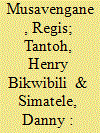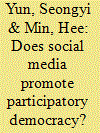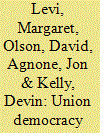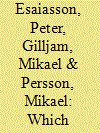|
|
|
Sort Order |
|
|
|
Items / Page
|
|
|
|
|
|
|
| Srl | Item |
| 1 |
ID:
167104


|
|
|
|
|
| Summary/Abstract |
In Africa, rural communities thrive on social capital and tend to have a number of commonalities that force them to share natural, physical and social resources. It has been a trend in sub-Saharan Africa to have either formal or informal collaborative management agreements to manage common pool resources (CPRs) to accommodate different actors and interests. This paper draws lessons from past and contemporary collaborative schemes in Cameroon and South Africa to enhance the practice and governance processes of natural resources in sub-Saharan Africa in order to promote sustainable development. Using research methods inspired by the tradition of participatory research to collect field-based data and complemented by reflections on previous and existing studies, the paper highlights the importance and benefits of participatory democracy as opposed to representational democracy in co-management of natural resources in rural spaces. It further discusses the need to redefine the roles of national and local governments, the youths and women in ensuring effective participation and the essence of unifying the judicial and culture. To guarantee sustainability of collaborative community-based natural resources, the paper emphasises the role and importance of youth and women empowerment. These issues have been discussed within the broader sustainability discourse.
|
|
|
|
|
|
|
|
|
|
|
|
|
|
|
|
| 2 |
ID:
175527


|
|
|
|
|
| Summary/Abstract |
This study examines whether social media contributed to the success of the Korean presidential impeachment protests of 2016–17 and promoted participatory democracy. The 2016–17 candlelight protests contributed to the overthrowing of a corrupt regime. However, was it a victory of participatory democracy? To answer this question, we must first be clear on what kind of participatory democracy is being referred to. Therefore, while social media played a crucial role in the success of the protests, the impact of social media on participatory democracy should be addressed separately. For this purpose, we first analyse the contributions of the digitally connected movements during the 2016–17 protests with two social movement theories: resource mobilisation and collective identity. Second, we examine whether the success of digitally connective movements during those protests promoted participatory democracy. To discuss this issue, we use Arnstein’s concept of a ‘ladder of participation’, which describes participatory democracy as falling within three levels, from non-participation through tokenism to citizen power. This study shows that the proliferation of social media politics by itself does not convert representative democracy into participatory democracy. This implies that even if social media augments citizens’ power of resistance, it cannot transform citizens into a governing power.
|
|
|
|
|
|
|
|
|
|
|
|
|
|
|
|
| 3 |
ID:
151623


|
|
|
|
|
| Summary/Abstract |
Despite policy commitments and legislated mechanisms, the system of participatory democracy in post-1994 South Africa is largely considered to have failed. In order to understand how underlying ideas can help to explain weaknesses in practice, this article examines how participatory democracy is understood by the ruling African National Congress (ANC). It shows that the multiple intellectual traditions shaping the participatory model have led to a set of policy initiatives that are not without internal tension. In part, the technocratic creep associated with improving public sector performance has stymied participatory efforts by placing efficiency and delivery over democracy and empowerment. Alongside this, however, the ANC's own conception of ‘democracy’ remains interwoven with its mass movement history – linking the role of popular participation to the extension of its own hegemony. The intent of policy to deepen democracy through structures of participatory governance is thus undermined by a teleological framing of participation as an intra-movement activity.
|
|
|
|
|
|
|
|
|
|
|
|
|
|
|
|
| 4 |
ID:
088916


|
|
|
|
|
| Publication |
2009.
|
| Summary/Abstract |
Trade union leaders serve dual, seemingly contradictory roles. They must command militant organizations in conflicts with employers. Simultaneously, they must be accountable and democratically responsive to their members. Few unions possess the institutions or leadership to accomplish both. This article analyzes the practices of the International Longshore and Warehouse Union (ILWU), in which effective contract negotiation (including leadership during strikes) and an informed, active rank-and-file democracy are mutually supportive. We offer an alternative to standard accounts of union democracy. While the claims are based on a detailed case study, the theoretical model and its insights hold for labor unions and organizations more broadly.
|
|
|
|
|
|
|
|
|
|
|
|
|
|
|
|
| 5 |
ID:
118531


|
|
|
|
|
| Publication |
2012.
|
| Summary/Abstract |
How can democracies satisfy citizens' demands for legitimate decision making? This article reports findings from a randomised field experiment designed to mimic decision making in large-scale democracies. Natural collectives of individuals with a shared history and future (high school classes) were studied. They were asked to make a decision about how to spend a sum of money under arrangements imposed by the researchers and distributed randomly across classes. Within this setting, empirical support for three ideas about legitimacy enhancing decision-making arrangements is tested: participatory constitution-making; personal involvement in the decision-making process; and fairness in the implementation of arrangements. Throughout the analyses it was found that personal involvement is the main factor generating legitimacy beliefs.
|
|
|
|
|
|
|
|
|
|
|
|
|
|
|
|
|
|
|
|
|